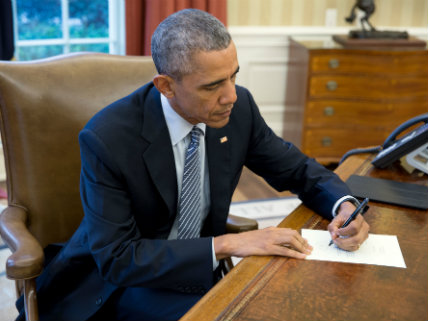Obama Officially Kills Bush-Era Muslim Registry Program Before Trump Can Resurrect It
Some 93,000 immigrants were put through the NSEERS program without a single one being convicted on any terrorism charges.

He didn't close Guantanamo Bay, end American drone strikes on foreign countries, or roll back the surveillance operations created after 9/11, but less than a month before leaving office, President Barack Obama killed at least one civil-liberties-violating program from the George W. Bush era.
The Obama administration on Thursday officially shuttered the National Security Entry-Exit Registration System, or NSEERS. From 2002 until 2011, NSEERS required visitors from 25 "high risk" countries (24 of them were in the Middle East; North Korea was the other) to register with the U.S. Department of Homeland Security, undergo interrogations and fingerprinting when they entered the United States, and periodically check-in at government offices while they were here.
While it was operational, some 93,000 immigrants were put through the NSEERS program without a single one being convicted on any terrorism charges.
That poor track record caused the Obama administration to put the NSEERS program into hibernation in 2011. Thursday's action, though somewhat symbolic because the program hasn't really existed for more than five years, was important because it makes it more difficult for the incoming Trump administration to resurrect NSEERS.
As I wrote last month, members of Trump's transition team were reportedly considering using the registration program as a way to meet The Donald's campaign promise to implement "extreme vetting" for Muslim immigrants. Kris Kobach, Kansas Secretary of State and an immigration hardliner who is serving on Trump's transition team, helped develop NSEERS as a member of Bush's Department of Justice.
According to the New York Times, the White House's decision to end the registry "is among the actions being taken in the final weeks of the administration that could prevent, or at least slow, what Democrats fear may be a swift rollback of President Obama's efforts on immigration and climate change."
It's a shame that it took the threat of Donald Trump's inauguration for Obama to do away with NSEERS. The program was an abusive failure. According to the ACLU, NSEERS "singled out immigrant men and boys from designated countries for extraordinary registration requirements with DHS, ranging from an extra half-hour of screening on arrival, through tracking of whereabouts while in the United States, to limitations on points of departure." The scale of profiling was something not seen in the United States since the Japanese-American internment camps during World War II and "Operation Wetback" deportations to Mexico in the 1950s.
It's not hard to figure out why the program failed to identify any potential terrorists. It was, by nature, targeting only law-abiding immigrants. As Reason's Shikha Dalmia wrote last year: "Expecting terrorists to voluntarily stroll to an immigration office to be fingerprinted and IDed is absurd, of course. So the entirely predictable upshot of the program was that although it managed to obtain not a single terrorism-related conviction, it did ruin plenty of lives of peaceful Muslims caught in its dragnet."
KellyAnne Conway, Trump's campaign manager and newly appointed White House aide, told CNN on Thursday the incoming administration would not pursue an immigration policy based on religion. But Trump, following attacks in Germany carried out by ISIS sympathizers, seemed to indicate that restrictions on Muslim immigrants were still part of his plans.
Either way, getting rid of the NSEERS program is worthy of applause, even if I'd prefer to have a president who cares about protecting civil liberties without needing the motivation of protecting his own political legacy.
For more on Obama's legacy and his administration's failure to rein-in Bush era excesses of the War on Terror, pick up a copy of the latest dead-tree edition of Reason (or, if you're a subscriber, you can read Gene Healy's look back at the past eight years here).


Show Comments (172)